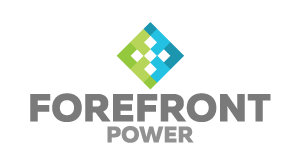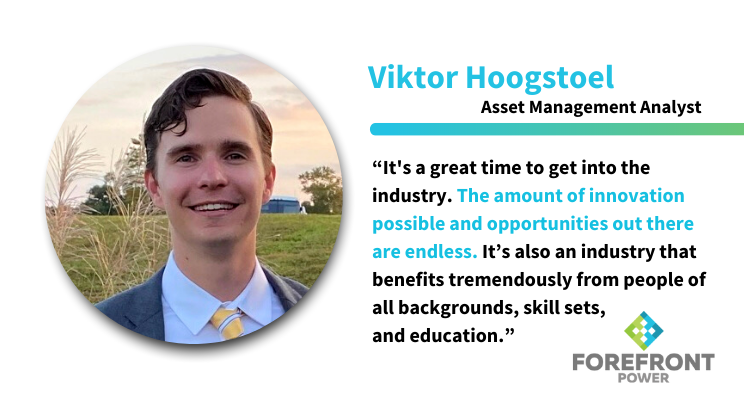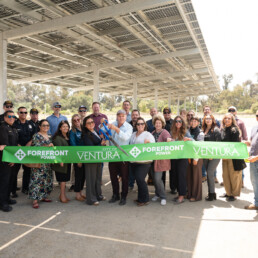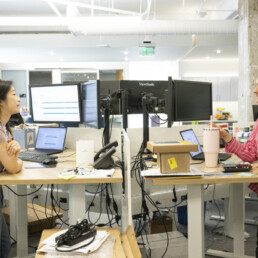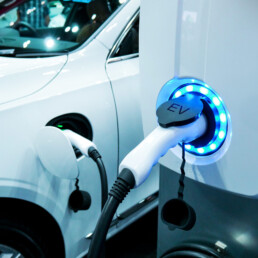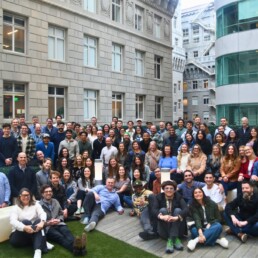We spoke to ForeFront Power’s Asset Management Analyst Viktor Hoogstoel to learn how he helps ensure our solar assets are performing at their best and hear his thoughts on the future of the industry.
Where are you from originally?
VH: My family and I are first-generation Americans and have been here for more than 20 years. I was born and raised in Belgium and moved to the US in the late 90s. I learned to speak English through the public school system, but we still speak Flemish at home and stick to our roots pretty well.
What do you like to do in your free time? Do you have any hobbies?
VH: I like to take advantage of ForeFront’s generous work-life balance and spend as much time outside as I can. In my free time, I usually go for a bike ride, run, or swim. I’m typically very active. One hobby I got into after college was triathlon training. I try to compete competitively at least a couple of times a year. In 2019, I did the biggest race I’ve ever done, which was the Ironman Distance Triathlon. It took me like twelve and a half hours nonstop, but it was a lot of fun.
Who inspired you when you were younger?
VH: My grandfather was a huge inspiration to me. He spent his career in construction and would drive me around town to show me bridges and different projects that he had built. I thought that was so cool. As a child, it makes a lot of sense to see something tangible. Because of that, I always knew I wanted to build or create things. I actually wanted to be an engineer. I still have papers from when I was in kindergarten asking me what I wanted to be when I grew up and I said engineer. I’m surprised I was even able to pronounce that word back then.
What led you to the renewable energy field?
VH: When I was pursuing an engineering degree in college, I worked on a few projects that were closely related to the energy field. Basically, everything we touched in engineering classes was energy-related. Being a friend of nature, I’ve always liked the idea of sustainability. ForeFront is a great company for me because it ties those two things together. I am thankful I found a way to work in both energy and sustainability.
How did you find ForeFront Power? When did you join the team?
VH: I joined ForeFront Power in 2019. I was in a completely different industry at the time, and I got really inspired by what a close friend working at ForeFront told me about the company. When an Asset Management Analyst position opened up, the role seemed like a perfect fit and was exactly what I was looking for. I was the first analyst hire on the team and we’ve grown a lot since then.
What are your responsibilities as an Asset Management Analyst?
VH: Our department’s main function is taking our solar assets either built by our development team or by another party to ensure these projects perform at the expected level for the entirety of the project’s operating life. We also have to make sure that our contractual obligations with our customers are being met like our performance guarantee and panel cleaning services. We’re on top of all of these things on a day-to-day basis. I’m typically reviewing monitoring data from our solar assets. We have a great monitoring platform that lets us see all the live data on site performance. We can see how a site performed yesterday or even last year. Everybody has a certain set of projects that they’re responsible for, and we work really well together as a team to make sure everything’s running great.
What is one of the most memorable projects you’ve worked on at ForeFront?
VH: We had this big migration from one monitoring platform to another about a year ago which was really interesting to be involved in. For that migration, we had to configure all of the sites so that the system knows how our solar assets should be performing. It actually tells us when it thinks that something’s wrong. It makes my job a lot easier since it’s already looking for underperformance and I just need to verify and call somebody up to go fix it. Now, we’re currently managing hundreds of sites on this platform and get to analyze new data that comes in every 5 minutes on all sites.
What do you enjoy most about working as an asset management analyst in the renewable energy field? What do you find most challenging?
VH: Every day when I walk into the office, it’s a different day. You never know what you’re going to get. There are a lot of ways that a system can underperform or be impacted by being exposed to the outside elements. We’re constantly problem solving and figuring out how to address challenges that arise in the field in the most efficient and cost-effective way. There’s also so much room for innovation. We’re always improving our own processes, resolving items, and finding ways to prevent them from coming up again in the future.
In terms of most challenging, we have such a big portfolio and our fleet is constantly growing. As we grow, we are working to ensure that we deliver on the value proposition that our customers have grown to appreciate about us – that we’re a nimble team who responds to issues in a timely manner to maximize performance.
What are some key considerations that go into ensuring a solar energy project is operating optimally?
VH: Preventative maintenance is key. It’s a lot like going to a dentist where you get a check-up once or twice a year and then hopefully you don’t have any cavities. Our operations and maintenance work on these projects includes annual to semiannual preventative maintenance visits where technicians go through a thorough comprehensive checklist to keep the system in good health. You can detect and prevent issues early on if you’re paying attention to gradual changes. We’ve found that preventative care helps lower our overall maintenance budget and helps keep our solar assets operating at their best.
How have you seen ForeFront Power evolve alongside the solar landscape over the past few years?
VH: For starters, we now have three times the kilowatts under our management than we had when I began here about two years ago. Along with our number of assets, we’ve also increased our number of offerings. We’ve started taking on storage assets and launched a third-party asset management business where we reach out to other clients to manage their existing solar assets even if we didn’t build them. We’ve also started some really innovative pilot programs, partnering with AI-based companies that look to reduce demand in our customers’ building management systems. This helps our customers’ heating and cooling start up at smart times when it’s really cheap to buy energy and it shuts them down when it’s really expensive to buy energy. It’s been really exciting seeing how our offerings continue to grow.
What do you envision for the future of the energy industry?
VH: It’s going to be a wild ride for sure. The energy field has gotten a lot of attention in the news with climate change and progress on local, national, and corporate sustainability goals. This is something that’s going to directly impact our industry. We collectively need to diversify our energy sources to include more renewable solutions. We also need to improve our grid infrastructure to deliver energy safely and avoid safety hazards like wildfires. We need to start working together with our utilities and governments to push for a sustainable future and get everybody moving towards the same goal.
What advice would you give to young people pursuing energy careers today?
VH: I think it’s a great time to get into the industry. Clearly, we have a big climate problem ahead of us and we don’t quite know how we’re going to solve it. It’s very easy to make a dent in this industry by coming up with ideas and following through on them. The amount of innovation that’s possible and the opportunities out there are endless. There are not a lot of careers or industries where such possibilities exist, it seems. In a lot of ways, the renewable energy industry is still in its infancy, solar especially. Nobody knows the perfect solution, but It’s really awesome to be contributing to how we solve the problem.
It’s also an industry that benefits tremendously from people of all backgrounds, skill sets, and education. Don’t worry if you’re not technical or don’t have an engineering degree, just bring a unique perspective and positive attitude.
Interested in learning more?
We would love to discuss how our solutions might be a fit for your organization. Contact one of our solar, storage, or e-mobility experts today:
